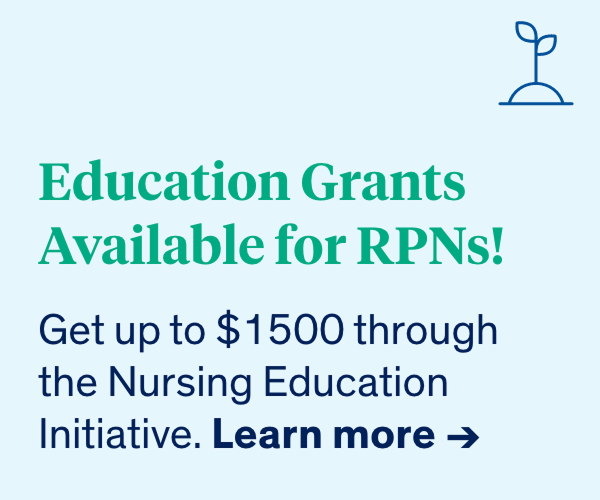Certification offers nurses an opportunity to demonstrate a high level of competence in a particular discipline.
Certification offers health and other professionals an opportunity to stand out from the crowd and demonstrate a high level of competence in a particular discipline. Historically, Registered Practical Nurses (RPNs) have not had the opportunity to access this kind of accreditation. But the tides are about to change. This fall, the Canadian Nurses Association (CNA) will be offering its first gerontological nursing certification for RPNs. We connected with Mike Villeneuve, Chief Executive Officer of CNA, to get his take on why this is happening now and what the benefits are for RPNs.
What Are the Benefits of Certification?
The first and most important thing is that there is a great benefit for patients. Many nurses choose to pursue certification to make their care better. We have a growing body of data to show that where there are more certified nurses on a unit in hospital or within long-term care, for example, we see reduced odds of mortality, less falls and shorter lengths of stay amongst other outcomes. These are very demonstrable out- comes that make certification very desirable for patients.
I’d also say it makes nurses feel proud. I know nurses who have been certified for 25 years and they still wear their pin and say, ‘I’m a certified nurse.’
In a time when every group, in every sector, is clamouring for higher credentials and more knowledge, there is a professional advantage to being able to show to the world that you have been accredited and this program meets those needs very well.
Why Has CNA Decided to Offer This Certification to RPNs?
The main reason is that RPNs have been asking for this for a long time! As a provider of professional services, if the people you represent are saying this is a service they want, you have to look at it.
I think we’re seeing a lot of changes in nursing. Over the past 25 years, RPNs have advanced tremendously in terms of scope, education, and accountability and autonomy. The RPN today is far from the nurse’s assistant, as they were once known when I got into nursing. As the profession continues to make head- way, a companion piece to that progress is to give RPNs more opportunities to move into more specialty areas. If RPNs want to take on the mantle of professional practice and all that goes with it, then it makes sense to start to look at ways to enhance their body of knowledge through access to specialized knowledge like that tested through certification.
Also, as an organization, the CNA is evolving. As your members may know, our organization has historically been RN led and recently our members held an overwhelming vote in favour of opening the door to practical nurses. For us, the next logical step is to offer all nurses access to similar sorts of programs and services.
Who Should Consider Pursuing Certification?
This certification is for nurses with a certain degree of practice experience. Nurses have to come with two full-time equivalent years of practice before they’re able to write the exam. That’s because the exam is designed in such a way to test knowledge that a nurse would have acquired through experience. It’s not just pure physiology or pathology but how it is applied in practice settings. In the case of the gerontological exam, we’d be looking for nurses to come with two years of gerontology experience, so you have to be quite committed to this practice area to write. That said, it will set you up if you want to be able to demonstrate that you’re the person who has the specialty knowledge and you can prove it.
For the full eligibility details, visit the CNA website www.cna-aiic.ca/en/certification
What Is the Timing for the Gerontological Exam?
The application period to write the exam opened on June 27th, 2019, and goes until Sept. 30th. There is a fee associated with writing. After you’ve demonstrated that you meet the qualifications you’ll be invited to write the exam electronically at a testing centre between Nov. 1st to 15th, 2019.
Your exam results will be mailed to you six to eight weeks after the exam window is closed and will also be posted on MyCNA. If you are successful, you will receive a certification portfolio containing your official result letter, your specialty certification pin and a certification certificate.
Can RPNs Expect Other Certification Programs in the Future?
Yes. The next certification program we are currently working on is a Med-Surg certification. We are still in the very early days of the development process for that certification and [are] beginning to recruit the experts to develop content for the exams. It does take quite some time, as long as 18-20 months, to develop the exam to make sure it’s rigorous and reliable. We’d be looking at offering this new exam likely in 2021. But you’ll be some of the first to know!
Do You Have Any Other Thoughts That You Want to Share With RPNs?
I hope RPNs are seeing that talk is turning into action. We’re in the process of trying to transform a 111-year-old organization that’s been Registered Nurse focused from Day 1 into something new. I hope RPNs recognize that we’re trying to evolve that focus so they feel welcomed and included. I’m hopeful offering this kind of certification is one of many ways we’ll continue to do that.

